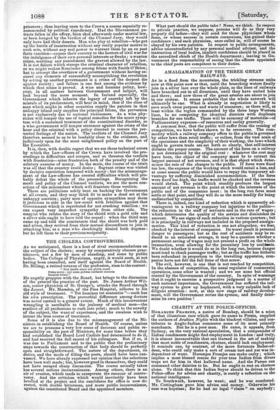AMALGAMATION OF THE THREE GREAT RAILWAYS.
As in a flood from the mountains, the trickling streams unite now at this point now at that, until the branching waters finally join in a silver lace over the whole plain, so the lines of railways have branched out in all directions, until they have united here and there ; and now three of the great arteries are about to join in one system. It seems probable that the whole network will ultimately be one. What is already in negotiation is likely to save much cross purpose and waste of resources; as there will, at least within the region commanded by the three large Western lines, be no competing for identical districts with duplicate branches for one traffic. There will be economy of materials—of Parliamentary expenses—of resources and outlay generally. A common fear, that the public will suffer from the ceasing of competition, we have before shown to be erroneous. The com- modity which a railway company offers to the public is governed by other laws than retail traffic; or rather, from the vast scale of the operations and the simplicity of their working, the laws which ought to govern trade are set forth so clearly, that self-interest dictates the proper course. The amount of the fares on a railway is not determined by the original cost : whatever the cost may have been, the object of the company must be to extract the largest amount of net revenue, and it is that object which deter- mines the rate of the charges to the public. If fares were fixed too low, the expense of the working stock would entail a loss, and at some season the public would have to repay the temporary ad- vantage by suffering diminished accommodation. If the fares were fixed too high, the traffic would be checked and the revenue would shrink. The point which steadily produces the largest amount of net revenue is the point at which the interests of the public and of the companies meet : in the long run fares must settle at that point, and they will do so the more readily for being undisturbed by competition.
There is, indeed, one kind of reduction which is apparently ad- vantageous to a railway company but injurious to the public,-- the reduction in the staff of servants and in the rate of wages ; which deteriorates the quality of the service and diminishes its amount. We see signs of such reduction in various quarters ; but it is principally in railways not included in the proposed amalga- mation. This kind of reduction is one not altogether, we fear, checked by the interest of companies. Its worst result is personal danger to passengers; but as the cost of accidents may be re- duced to an estimated average, it may be a question whether a permanent saving of wages may not present a profit on the whole transaction, even allowing for the pecuniary loss by accidents. We doubt whether it would do so in the long run, because danger must tend to check passenger traffic ; but as the traffic has hitherto been redundant in proportion to the travelling apparatus, com- panies have not felt the full force of that screw.
The evil, however, is one that is not reached by competition. In the absence of competition, the usual regulator of commercial operations, some other is wanted ; and we see none but official control by the Government of the country. In spite of warnings that it ought to exercise a prospective judgment in a matter of such national importance, the Government has suffered the rail- way system to grow up haphazard, with a very culpable lack of diligent attention : now, at this new stage of railway develop- ment, will the Government revise the system, and finally deter- mine its own position ?


























 Previous page
Previous page